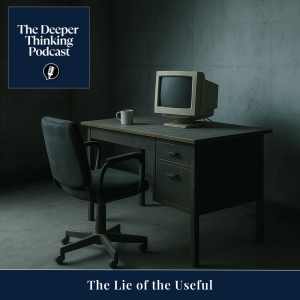
Friday Apr 04, 2025
The End of Usefulness is the Beginning of Being (The Lie of the Useful) - The Deeper Thinking Podcast
The End of Usefulness: AI, Automation, and the Quiet Return to Being
A quiet reckoning with the values we never questioned, and the selves we lost to usefulness.
Artificial intelligence (AI) is taking our jobs. But that isn’t the problem. This episode explores what lies beneath the fear of automation—not economic disruption, but the quiet exposure of a system that never truly valued us beyond our usefulness. When the machines arrive, it is not just work that disappears. It is the illusion that dignity was ever built into the code.
This is not a technological crisis. It is a philosophical unmasking. For generations, usefulness was mistaken for virtue, and exhaustion for proof of worth. But AI does not believe in effort. It does not reward loyalty. It simply reveals that the system we trusted was never designed to care. And in that exposure, something else emerges: a deeper silence, a chance to see what might remain when function is no longer the measure of being.
What happens when usefulness ends, and we are still here?
Reflections
- What if productivity was never a moral virtue, just an imposed metric?
- Can worth exist independently of contribution?
- Is the fear of AI really a fear of no longer being needed?
- What remains when function is no longer our identity?
- How do we learn to dwell in a world that no longer measures us?
Why Listen?
- Understand the philosophical implications of AI beyond economics
- Explore how usefulness became a moral metric in capitalist systems
- Examine the emotional and existential impact of automation
- Hear a quiet argument for reclaiming value outside of function
Listen On:
Support This Work
If you'd like to support the ongoing work, you can visit buymeacoffee.com/thedeeperthinkingpodcast or leave a kind review on Apple Podcasts.
Bibliography
- Arendt, Hannah. The Human Condition. University of Chicago Press, 1958.
- Byung-Chul Han. The Burnout Society. Stanford University Press, 2015.
- Heidegger, Martin. Being and Time. Harper & Row, 1962.
- Illich, Ivan. Tools for Conviviality. Marion Boyars, 1973.
- Lazzarato, Maurizio. The Making of the Indebted Man. Semiotext(e), 2012.
- Stiegler, Bernard. Technics and Time, Vol. 1: The Fault of Epimetheus. Stanford University Press, 1998.
- Turkle, Sherry. Alone Together. Basic Books, 2011.
- Bostrom, Nick. Superintelligence. Oxford University Press, 2014.
- Christian, Brian. The Alignment Problem. Norton, 2020.
- Tegmark, Max. Life 3.0. Knopf, 2017.
- Crawford, Kate. Atlas of AI. Yale University Press, 2021.
- Suleyman, Mustafa. The Coming Wave. Crown, 2023.
- Zuboff, Shoshana. The Age of Surveillance Capitalism. PublicAffairs, 2019.
Bibliography Relevance
- Arendt: Illuminates how labor, work, and action are ethically distinct yet historically conflated.
- Byung-Chul Han: Frames burnout as a systemic, not individual, pathology of hyperperformance culture.
- Heidegger: Offers an ontological alternative to usefulness as the measure of being.
- Illich: Invites a revaluation of tools through conviviality and autonomy.
- Lazzarato: Exposes debt as a form of moral subjugation masked as personal responsibility.
- Stiegler: Examines technical memory and its effect on human individuation and temporality.
- Turkle: Tracks emotional dislocation in increasingly technologised relational landscapes.
- Bostrom: Warns of strategic risks posed by runaway machine intelligence.
- Christian: Details the ethical tension of aligning AI behavior with human values.
- Tegmark: Argues for proactive design of AI futures aligned with human flourishing.
- Crawford: Maps the extractive logic beneath the global AI infrastructure.
- Suleyman: Predicts structural shocks from AI beyond regulatory containment.
- Zuboff: Reveals how behavioral data has become a raw material for power.
When usefulness ends, we begin.
#ArtificialIntelligence #Capitalism #Automation #Existentialism #Burnout #Heidegger #Arendt #ByungChulHan #Stiegler #ProductivityMyth #Philosophy #PostWork #TheDeeperThinkingPodcast
No comments yet. Be the first to say something!